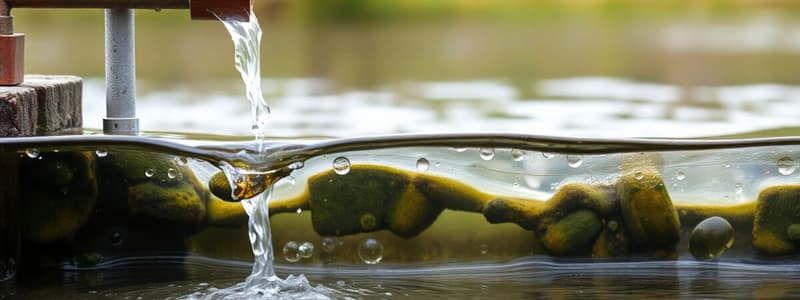Podcast
Questions and Answers
What is one primary cause of water shortages globally?
What is one primary cause of water shortages globally?
- Higher rainfall levels
- Decreased evaporation rates
- Increased water purification methods
- Increased population (correct)
Which method is used for determining water hardness in the content provided?
Which method is used for determining water hardness in the content provided?
- EDTA method (correct)
- Titration method
- Conductivity method
- Photometric method
What is a consequence of lacking clean, fresh water?
What is a consequence of lacking clean, fresh water?
- Enhanced productivity
- Higher agricultural yield
- Poor health (correct)
- Increased economic development
Which of the following is NOT a water softening process mentioned?
Which of the following is NOT a water softening process mentioned?
What factors are contributing to the vulnerability of fresh water resources?
What factors are contributing to the vulnerability of fresh water resources?
Which of the following describes 'caustic embrittlement'?
Which of the following describes 'caustic embrittlement'?
What is one major problem discussed concerning fresh water availability?
What is one major problem discussed concerning fresh water availability?
Why is effective water management important?
Why is effective water management important?
What is the primary source of surface water?
What is the primary source of surface water?
Which of the following is classified as hard water?
Which of the following is classified as hard water?
What influence does rainfall have on the availability of surface water?
What influence does rainfall have on the availability of surface water?
Which of the following water sources is NOT a type of surface water?
Which of the following water sources is NOT a type of surface water?
Which is an example of how surface water can be used?
Which is an example of how surface water can be used?
Which factor does NOT affect the availability of surface water?
Which factor does NOT affect the availability of surface water?
How is rainwater categorized in terms of water sources?
How is rainwater categorized in terms of water sources?
Why is freshwater crucial for industries?
Why is freshwater crucial for industries?
What causes the hardness of water primarily?
What causes the hardness of water primarily?
What is formed when soaps react with calcium or magnesium salts in hard water?
What is formed when soaps react with calcium or magnesium salts in hard water?
Which statement correctly describes temporary hardness of water?
Which statement correctly describes temporary hardness of water?
Which of the following is NOT a characteristic of hard water?
Which of the following is NOT a characteristic of hard water?
What is a common source of groundwater?
What is a common source of groundwater?
What process is used to access groundwater?
What process is used to access groundwater?
What effect does hardness have on soap?
What effect does hardness have on soap?
Which of the following ions can contribute to water hardness?
Which of the following ions can contribute to water hardness?
What is the primary reason for selecting CaCO3 as a standard for calculating water hardness?
What is the primary reason for selecting CaCO3 as a standard for calculating water hardness?
Which of the following units measures the parts of CaCO3 equivalent hardness per one million parts of water?
Which of the following units measures the parts of CaCO3 equivalent hardness per one million parts of water?
How is hardness expressed in terms of mg/L?
How is hardness expressed in terms of mg/L?
What is the equivalent of 1 mg/L in terms of parts per million (ppm)?
What is the equivalent of 1 mg/L in terms of parts per million (ppm)?
How many parts of CaCO3 equivalent hardness are in one Degree Clarke?
How many parts of CaCO3 equivalent hardness are in one Degree Clarke?
What is the total hardness of the water sample calculated in mg/L?
What is the total hardness of the water sample calculated in mg/L?
What is the expression for calculating hardness in CaCO3 equivalents?
What is the expression for calculating hardness in CaCO3 equivalents?
Which of these ions is NOT a common contributor to water hardness?
Which of these ions is NOT a common contributor to water hardness?
What constitutes temporary hardness in the water sample?
What constitutes temporary hardness in the water sample?
What is the value of permanent hardness calculated for the water sample?
What is the value of permanent hardness calculated for the water sample?
Why is hardness often expressed in CaCO3 equivalents?
Why is hardness often expressed in CaCO3 equivalents?
What would the temporary hardness convert to in 0Cl?
What would the temporary hardness convert to in 0Cl?
Which of the following substances contributes to permanent hardness?
Which of the following substances contributes to permanent hardness?
Flashcards are hidden until you start studying
Study Notes
Water Technology
- Water is a valuable natural resource, found in different forms in the environment.
- Water scarcity is a global issue due to increasing population, economic growth, and climate change
- Fresh water is limited and vulnerable.
- Lack of clean, fresh water impacts poverty reduction, national development, health, productivity, food security, and economic development.
Water Cycle/Hydrological Cycle
- The water cycle is the movement of water on, above and below the surface of the Earth.
Water Distribution on Earth
- Approximately 71% of the Earth's surface is covered by water, with only 2.5% of it being fresh water.
- Of the fresh water, about 68.7% is locked up in glaciers and ice caps.
- Only 0.3% of the world's water is available for human use.
Sources of Water
- Surface water, groundwater, and collected rainwater are the main sources of water for drinking, washing, agriculture, and industry.
- Surface water is located on the Earth's surface in rivers, creeks, wetlands, and reservoirs. It is produced by precipitation and water runoff.
- Groundwater is found below the Earth's surface, accessed through springs and wells.
- Rainwater is collected from roofs or other hard surfaces and can provide a valuable water source.
Hardness of Water
- Hardness is a measure of the concentration of multivalent cations in water, primarily calcium (Ca2+) and magnesium (Mg2+).
- Hard water prevents the lathering of soap due to the formation of insoluble salts of calcium and magnesium.
- Other multivalent cations such as Fe3+, Sr2+, Zn2+, and Mn2+ also contribute to water hardness.
Types of Hardness
- Temporary or Carbonate Hardness is caused by dissolved bicarbonates, carbonates, and hydroxides of calcium, magnesium, iron, and other heavy metals.
- Permanent or Non-Carbonate Hardness is not easily removed by boiling.
Hardness in terms of Calcium Carbonate Equivalents
- Hardness is calculated in terms of CaCO3 equivalents because it is the most common insoluble impurity in water and its molecular weight is 100, making calculations easier.
- The equivalent of CaCO3 is calculated as:
Mass of the substance * Equivalent wt.of CaCO3 /Equivalent wt.of the substance
Units of Hardness
- Parts per Million (ppm): Parts of CaCO3 equivalent hardness per 106 parts of water.
- mg/L: Milligrams of CaCO3 equivalent hardness per liter of water.
- Degree Clarke (oCl): Parts of CaCO3 equivalent hardness per 70,000 parts of water.
- Degree French (oFr): Parts of CaCO3 equivalent hardness per 105 parts of water.
Numerical Example Calculation of Hardness
- Total hardness is calculated by summing the CaCO3 equivalents of all hardness-causing substances in the water sample.
- Temporary hardness is the sum of the CaCO3 equivalents of the bicarbonates.
- Permanent hardness is the difference between total hardness and temporary hardness.
Conclusion
- Understanding water hardness is crucial for effective water treatment processes, as it affects the quality of water for drinking, washing, and industrial uses.
- Properly managing water hardness is important for ensuring safe and efficient water use.
Studying That Suits You
Use AI to generate personalized quizzes and flashcards to suit your learning preferences.




